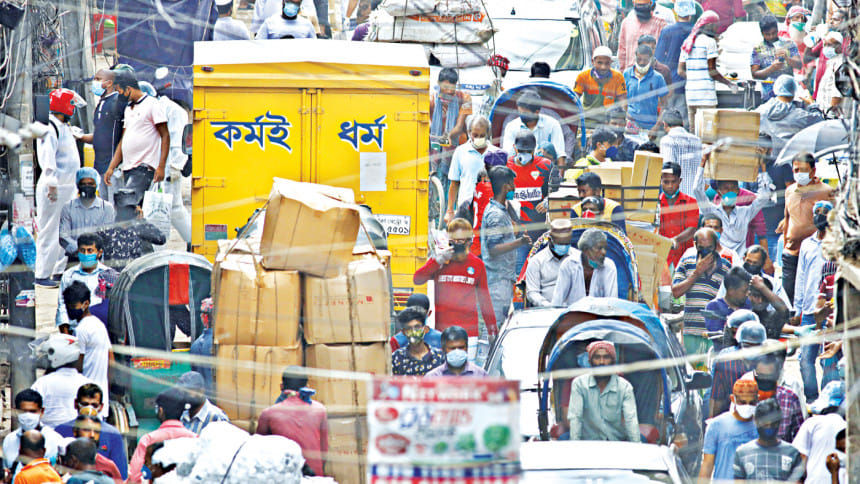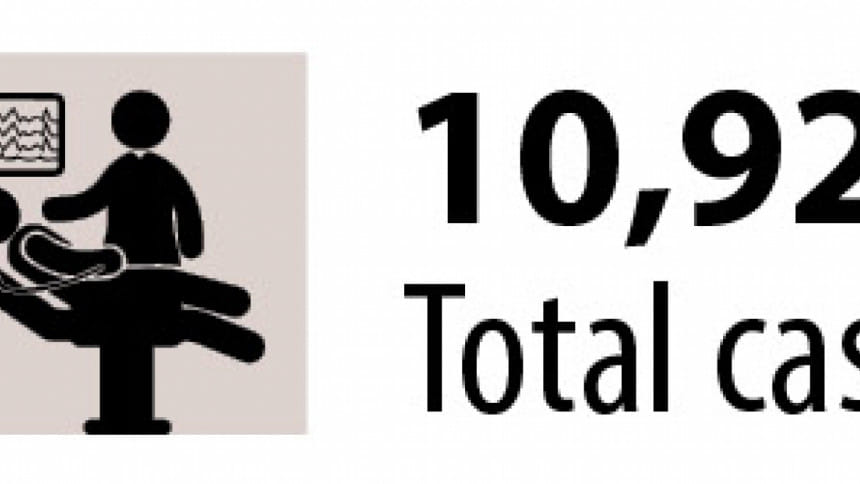BATTLING COVID-19: Are we leaving too much to chance?


In a desperate attempt to get the economy back on track, the government has reopened factories that remained closed for around a month in the wake of the coronavirus outbreak.
It has also decided to open shopping malls and markets on a limited scale from May 10 so that people can engage in economic activities centring the Eid-ul-Fitr to be celebrated later this month.
While reopening those key economic fronts, the government set out guidelines for social distancing and safety of workers and consumers alike.
Given that millions of workers are in economic hardship amid fears of job losses and businesses on the verge of collapse, it appears to be a pressing decision.
But is it a pragmatic decision when the virus cases are still on the rise in Bangladesh?
The country yesterday recorded 786 positive cases, the highest in a single day, as the total number of Covid-19 infections crossed the 10,000-mark on Monday.
In no certain terms do we know when the pandemic, which has so far claimed over 2.5 lakh lives and infected over 3.5 million people worldwide, would reach its peak in Bangladesh.
With an ill-equipped healthcare set-up and very limited testing abilities, a country of 160 million people is still not sure where it stands at the moment in terms of combating Covid-19 and how to flatten the curve.
Ever since the first coronavirus patient was detected on March 7, the number grew slowly for a period. But now the country is seeing an explosion of cases and a fluctuating number of deaths on a daily basis.
Five Covid-19 patients died on Monday, taking the death toll to 182.
Quoting experts and health officials, this newspaper in yesterday's issuereported that it was difficult to predict the course of the pandemic.
"The virus is on course to reach the peak slowly. However, we cannot say exactly when it will peak," the report said quoting Mushtaq Hossain, epidemiologist and consultant at the Institute of Epidemiology, Disease Control and Research (IEDCR).
The epidemiologist further said, "If we do not allow people on the streets, the virus will take longer to spread…
"But any wrong decision will cause a tsunami-like situation," he warned.
So far, social distancing in the form of lockdown has been the most effective weapon for a developing country like Bangladesh to combat coronavirus. But lax monitoring on that front coupled with gradual decline of civic awareness and voluntary participation, has put the collective consciousness into some sort of resignation.
We are perhaps in a state of mind of leaving the fight against Covid-19 to chance, unconsciously resorting to divine blessings more than a concerted effort to save us from what could possibly have a devastating impact.
"The situation is very complex. Community transmission is going on and the numbers are rising, while the rate of detection is still low. We have to increase the number of tests by a lot to fathom the situation," Be-Nazir Ahmed, former director (disease control) of the Directorate General of Health Services, told this newspaper.
Unless many more cases are detected through widespread testing, community transmission will continue and the situation will be out of hand, he pointed out.
While testing is of paramount importance, the opening of factories especially the worker-heavy garment factories actually made things more complicated as far as social distancing is concerned.
And once businesses and shopping malls reopen on May 10, the situation may get even more complicated.
The garment industry, which contributes 80 percent of the country's forex earnings, employs around 45 lakh workers while around one crore people are involved in businesses and shopping malls.
And then add a huge number of people coming out to buy merchandise, which could potentially create an ideal situation for Covid-19 to prosper, even if they don't go on a buying spree normally associated with festivals.
The government warned that social distancing and safety of workers in factories should be strictly maintained. It also said the same safety measures and social distancing should be enforced in businesses and shopping malls once they open.
But we have seen enough of mockery in the name of social distancing in kitchen markets every day almost everywhere in the country and we are hardly aware of the strict implementation of social distancing behind closed doors in those garment factories.
Anyone involved in the apparel business knows that social distancing in factories is quite impossible unless those units produce high-quality garments and that the buyers pay them well.
But for most garment factories that produce basic and cheap garments social distancing is simply not cost-effective. Survival of those factories depend on per-hour production efficiency, and more space and more production hours for the same output are a luxury they can hardly afford.
France is one of the worst victims of Covid-19, which has hit Europe hard. The affluent European country, which recorded more than 25,000 deaths caused by the pandemic, has been able to stymie the deadly virus recently.
While announcing the plan to reopen the economy in phases last week, French Prime Minister Edouard Philippe told his countrymen that they "will have to learn to live with the virus" with no vaccine or proven treatment yet available.
It is also true for the rest of the world.
But we are probably living with the invisible enemy a wee bit dangerously and hoping the Almighty would rescue us.

 For all latest news, follow The Daily Star's Google News channel.
For all latest news, follow The Daily Star's Google News channel. 



Comments